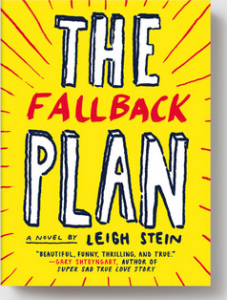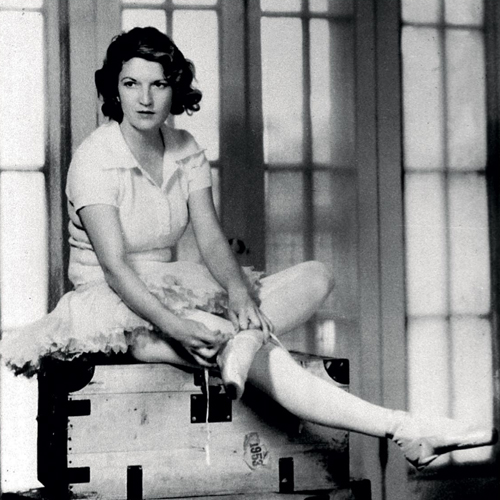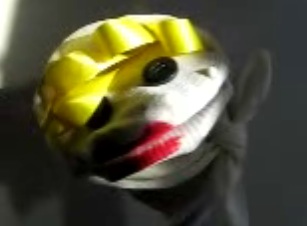OPEN LETTER TO HTMLGIANT: THE SEXISM STOPS HERE
I think everyone has an Internet feud they will never forget. Here’s mine: in January 2010, Jimmy Chen wrote a post for your site (that has since been removed) in which he showed a photograph of Zelda Fitzgerald and “complimented” her cute rolls of back fat. In the comments section, I called out the sexist move of reducing a female writer to the shape of her body, and was immediately dismissed with a “fuck you” and someone asking why I had a sexy picture of myself on my own blog.
And on my blog, Chen told me my life would be easier because my face looks like this.
In an open letter apology (that has also since been taken down), he wrote, in his defense:
“Leah [sic] Stein has a ‘right’ to post a sexy picture of her, and I have a ‘right’ to think her life will be easier because of her beauty than an ugly woman’s which is why she [sub]consciously posted it.”
There is nothing easy about the life of a writer with the face of a woman, especially when men get to tell you what you’re allowed to do with your face. Which brings me to yesterday’s post by Garett Strickland, about how Kate Zambreno humiliated him when she unfriended him on Facebook, taking away his ability “to participate in a conversation I’ve got as much right to as any other human being, regardless of the seemingness of my being white or male.”
Note that both Chen and Strickland are eager to point out their “right” to write whatever hateful, sexist, ignorant thoughts cross their minds, even in the personal spheres that female writers are often forced to create out of necessity for their own safety (Chen was commenting on my blog; Strickland was writing on Kate’s own Facebook page).
In retaliation for his hurt feelings, Strickland goes on to unleash what I can most accurately call a sloppy prose poem about sexual inadequacy, which ultimately turns Zambreno into a doll, “Made by Men,” who arrives in a box. When he pulls the string, she delivers “reactionary polemic” that Strickland can’t understand due to “personal deficiencies.”
Here’s the most significant thing Strickland doesn’t understand, the worst of his personal deficiencies: he doesn’t realize that by objectifying Zambreno and turning her into a doll, he is being aggressively chauvinist. He isn’t participating in a conversation he has a “right” to. Notably, in order to have a conversation, he has had to create a doll who can only spew pre-recorded messages, who can’t actually talk back.
To Chen and Strickland, I would ask: have you ever been reduced to a body and a face? Have you ever felt afraid for your safety because of your body? Has anyone ever trivialized your work because of your gender?
In the summer of 2011, I met with a team of Random House sales reps who would be responsible for bringing my novel and poetry collection to bookstores and libraries around the country. One asked me what kind of cover image I wanted for my novel.
“I only know I don’t want a headless woman on the cover,” I said. “I don’t want my book cover to exclude men from picking it up.”
“Do you really think a man would read your work?”
“Well, a lot of men like my poetry,” I said.
“Only because you’re cute,” I was told. By my editor.
I didn’t know what to say. I like to think that out of the 37 people in the world who read poetry, the men who read mine are finding some merit there, and not just jacking off to my author photo.
Chen has described Zambreno as “a feminist who hosts an irrational hatred of me due to not being able to perceive my misogyny ironically,” but what’s truly ironic in all this is that Zambreno has written an entire book about women who were written off, robbed, and institutionalized for/because of their creative talent, while their husbands and lovers were celebrated. I read Heroines with my jaw hanging open in recognition, especially when I got to page 140. She describes Chen’s Zelda post and the feuding in the comments section:
The snarky dismissal. I answer back with vitriol. It becomes heated, ugly. Personal. Slurs of a sexual nature slung in the comments section, mostly by a chauvinistic supporter of Chen’s. A way to bully, which is to humiliate, to silence, to make a woman smaller whose behavior is seen as outsized. (Won’t she fucking shut up?)
As writers, we know words carry power. I challenge HTMLGIANT contributors to use their power to make this site the weird-ass literary carnival it is at its best, without using discriminatory, sexist, hate speech that objectifies, humiliates, and infuriates their female readership. To quote the Urban Dictionary, please check yourself before you wreck yourself:
Take a step back and examine your actions, because you are in a potentially dangerous or sticky situation that could get bad very easily.
Sincerely,
Leigh Stein
Leigh Stein Interview (5)
 Leigh Stein’s yellow first novel, The Fallback Plan, is about a girl named Esther who has a degree in acting but has just been coasting since graduation, trying to adjust to a newer, sadder understanding of how the world works. “It was unfair that life was so irrevocable, that nothing could be frozen in time or retracted” she thinks in the final chapter called, appropriately, “Independence Day.” “I loved acting because it was like living inside of a fixed amount of time, looped from start to finish. In rehearsal, I went through the best and worst moments of some woman’s life, again and again, until I’d perfected them.” Now, feeling like a stranger in her parents’ backyard, she sits in the distance and watches the lives of the people around her and it seems like she resolves, at last, to take the long way through her own life. I asked Leigh about that for my last question in this week-long interview (see parts one, two, three and four). READ MORE >
Leigh Stein’s yellow first novel, The Fallback Plan, is about a girl named Esther who has a degree in acting but has just been coasting since graduation, trying to adjust to a newer, sadder understanding of how the world works. “It was unfair that life was so irrevocable, that nothing could be frozen in time or retracted” she thinks in the final chapter called, appropriately, “Independence Day.” “I loved acting because it was like living inside of a fixed amount of time, looped from start to finish. In rehearsal, I went through the best and worst moments of some woman’s life, again and again, until I’d perfected them.” Now, feeling like a stranger in her parents’ backyard, she sits in the distance and watches the lives of the people around her and it seems like she resolves, at last, to take the long way through her own life. I asked Leigh about that for my last question in this week-long interview (see parts one, two, three and four). READ MORE >
Interview with Leigh Stein (3 and 4)
 Leigh Stein’s meaningful first novel, The Fallback Plan, is about a girl named Esther who has just graduated from college and is feeling aimless and depressed, which, okay, sounds like a well-visited premise for a novel. But Esther is so witty and likable that you can’t help enjoying her mild misadventures. I’ve been emailing a question to Leigh every day this week, but yesterday she was caught up on her book tour (is she in your town?), so here are two questions
Leigh Stein’s meaningful first novel, The Fallback Plan, is about a girl named Esther who has just graduated from college and is feeling aimless and depressed, which, okay, sounds like a well-visited premise for a novel. But Esther is so witty and likable that you can’t help enjoying her mild misadventures. I’ve been emailing a question to Leigh every day this week, but yesterday she was caught up on her book tour (is she in your town?), so here are two questions
HTMLGIANT: Can I tell you something? Why is the novel so funny? Or, seriously, what was the writing process like? How many revisions did it take to get all the jokes in there? Like, “A small part of me threw up.” Or making a confused facial expression to trick the IPASS sensor, or a mom with a “hairstyle most conducive to storing pencils” instead of one who says “well look at that” when you show her how to enlarge the type in MS Word.
LEIGH: Esther makes jokes as a way of pricking the bubble of despair and stagnation she lives in, because that’s what I do. READ MORE >
Interview with Leigh Stein (2)
 Leigh Stein’s laugh-out-loud-funny first novel, The Fallback Plan, is about a girl named Esther who has just graduated from college and, for lack of anything better to do, takes a job babysitting for a girl named May, whose parents, Nate and Amy, lost their first child a few years before. Bored, Esther spends a lot of time imagining a Chronicles of Narnia redux, featuring panda bears.
Leigh Stein’s laugh-out-loud-funny first novel, The Fallback Plan, is about a girl named Esther who has just graduated from college and, for lack of anything better to do, takes a job babysitting for a girl named May, whose parents, Nate and Amy, lost their first child a few years before. Bored, Esther spends a lot of time imagining a Chronicles of Narnia redux, featuring panda bears.
HTMLGIANT: One thing I am thinking about writing about it is about doors. The Fallback Plan has some good ones — the door to the dead child’s room, the door to the studio, the panda’s doorway to the other world, the father’s security concerns, the throwing of keys, and the whole book represents Esther’s passage into adulthood. Was there anything intentional you were thinking about the doors when you were writing this?
Leigh: I wasn’t thinking intentionally about doors…I wish I was! That would make me seem so smart. One thing I do sometimes to test my memory is try to remember doorknobs. Like in the house I lived in until I was 13 or 14, the doorknobs were very particular (inspiring the doorknob to the attic in my novel) and by remembering them, I feel like I still hold on to a little piece of that house.
Interview with Leigh Stein, who wrote The Fallback Plan
 Leigh Stein’s laugh-out-loud-funny first novel, The Fallback Plan, is about a girl named Esther who has just graduated from college and, for lack of anything better to do, moves in with her parents. She takes a job babysitting for a girl named May, and she has a tepid affair with May’s father. She also has a crush on a guy named Jack, and they have sex, and right before they do it Esther tries to think about something sexy, so she thinks about a Winnebago. It’s with that in mind that I asked Leigh Stein to do this interview. I only had one question.
Leigh Stein’s laugh-out-loud-funny first novel, The Fallback Plan, is about a girl named Esther who has just graduated from college and, for lack of anything better to do, moves in with her parents. She takes a job babysitting for a girl named May, and she has a tepid affair with May’s father. She also has a crush on a guy named Jack, and they have sex, and right before they do it Esther tries to think about something sexy, so she thinks about a Winnebago. It’s with that in mind that I asked Leigh Stein to do this interview. I only had one question.
Me: Wait, are Winnebagos sexy?
Leigh: Winnebagos are sexy for the following reasons:
1. They suggest adventure, the romance of the open road, Americana.
2. You could say “Let’s run away!” to your loved one, and then actually do it in one of these.
3. A bed + a motor vehicle = sexy.
I can’t recommend this novel, and this manner of thinking, any more highly than I already do.
Blogger of the Weekend Award
Leigh Stein posted some hysterically great stuff this weekend, and so I am giving her the “First Semi-Annual HTMLgiant Blogger of the Weekend Award.”
Check out this video of a sock puppet reciting a poem of hers, and also this excerpt from a Will Eno play. Additionally, all the posts she puts up about the kids in her musical theater class are awesome, so put her on your Google Reader. Enjoy.
Absent open for subs

This is not Leigh Stein, nor is it Absent Magazine.
from Absent:
We are now reading submissions of poetry for our next issue. Please spread the word! Send up to 10 pages of poetry, in the body of an email or as a .doc or .rtf attachment, to absentsubmissions [at] gmail [dot] com. Simultaneous submissions are fine, just let us know if your work is accepted elsewhere. We do not accept previously published poems. We will attempt to respond to all submissions within a month. If you would like to submit in another genre (prose, sound, image, etc.) please query.
Absent is a beautifully designed journal of poetry, some prose, essay, sound.
I like this poem by Leigh Stein from issue 3 (though I liked it even better before I found out Rattawut Lapcharoensap is a real person).
December 7th, 2008 / 10:48 pm


